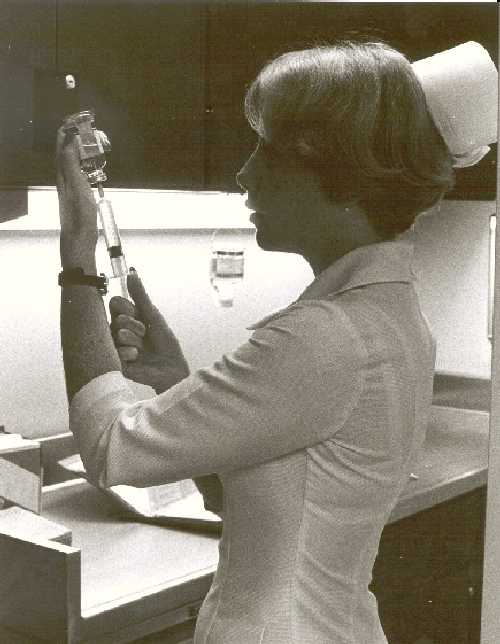Nursing Education
March 23, 2009 by Rn2b
Filed under Certified Nursing Assistant (CNA), Nurse Programs
The relation between the Levels of Nursing Practice and Nursing Education
There are different levels of nursing practice that is related in the field of nursing education. One cannot just jump to the highest level of nursing practice without having to go to the process of formal education. Also these levels differentiates nurses from one another; skills and knowledge, description of jobs, salary, work shifts, participation in the hospital and a lot more. If you think that all nurses can be a doctor’s assistant, well think again.

There is a ladder that signifies the step-by-step procedure in attaining the highest level. Getting to know the basics of care giving is probably the first step in nursing; you can attain that by a 2-month education as a certified nursing assistant. If you are a certified nursing assistant then you’ll probably be the one to help patients walk, reach something, help them go to bed or take another position, feed them.
LPNs or Licensed Practical Nurses on the other hand are different. LPNs progress in terms of their knowledge and skills compared to the CNAsor certified nursing assistants. Even though LPNs can do the things that normal CNAs do, they can also cover up wounds of patience, give alcohol massages, direct medications such as giving injections, analyze the progress of patients, and any other orders that a higher nursing rank can give. They still cannot take orders from doctors directly.
If you want to have the opportunity to work with doctors, I suggest you get registered. Registered nurses are those who pass the nursing licensure board exam. Their knowledge has been tested and so are their skills. They can work in hospitals to assist doctors in different operations; they also have the proper knowledge in making equipments work in the hospitals. Of course they are paid higher than CNAs and LPNs.
The Different Types of Nursing Programs
March 6, 2009 by Rn2b
Filed under Certified Nursing Assistant (CNA), Finding Your Nursing Job
The Different Types of Nursing Programs
Nursing Education is not limited, in fact almost every universities and colleges offer Bachelor of Science in Nursing since a lot of people get sick everyday and a many of them get confined in hospitals and nursing homes for medical attention.
If you want to work as a nurse in hospitals and not just houses for care giving, then you should get a diploma that will allow and certify you to work in hospitals. Nowadays, those people who want to work in hospitals as a nurse get registered. They take a nursing licensure exam and if they pass they get to be a registered Nurse. Registered nurses are the ones who assist doctors and manage equipments in the hospitals; their task is not just limited to care giving alone. Most of the time, only those who have studied a four-year college program in nursing gets to pass the licensure examination for registered nurses so be sure you have the proper nursing education to back you up.
If you want to go farther with your nursing education, I suggest you take up a masters program in the fields of nursing so that you can be an advanced practice registered nurse. This means you are able to specialize in a certain field therefore attaining levels such as Certified Nurse Midwife, Certified Nurse Specialist for Psychiatric/Mental Health, and a lot more.
If you have to heart in giving care to other people, then taking the different nursing programs will probably do your career good.
Nursing Specialization Training
December 18, 2008 by Rn2b
Filed under Certified Nursing Assistant (CNA), Types of Nurses
The field of nursing simply doesn’t end with nurses caring for patients or assisting doctors in examining patients. There are more to nursing if one continues their education or takes a Masters Degree in Nursing. After getting a license to practice nursing, one can choose to study and specialize in different nursing fields. Some of these nursing specialized field include:
Surgical Nursing which specialized in helping doctors in surgical operations.
Nursing Educators are nurses who teach licensed practical nursing courses and prepares licensed nurses to practice positions.
 Nurse Anesthetists can replace the work of anesthesiologists and can administer all types of anesthesia to patients.
Nurse Anesthetists can replace the work of anesthesiologists and can administer all types of anesthesia to patients.
Case Management specialists work in the field of health care. These types of nurses are the ones who help and assist HMOs in assessing clients and sees to it that they can help in reducing costs by giving the right recommendations. They are the ones who coordinate with hospitals and doctors in behalf of the HMO and their clients.
Nursing Researchers are the ones who try to improve the field of nursing through everyday situations. They research, do case studies, interviews and do focus grouping to obtain data needed.

Legal Nurse consultant assists for law firms and HMO when litigation takes place. Using their expertise and years of experience, they help attorneys on legal terms used in the medical field and advice them base on case facts.
Nurse Practitioners can diagnose patients as a doctor would but they need to get certified in that field first. They are allowed to open clinics in some states.
There are so many exciting options when you are a registered nurse plus nursing specialization gives you a better salary then being an ordinary registered nurse.

